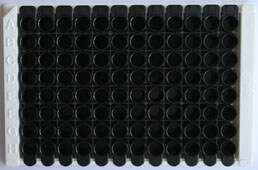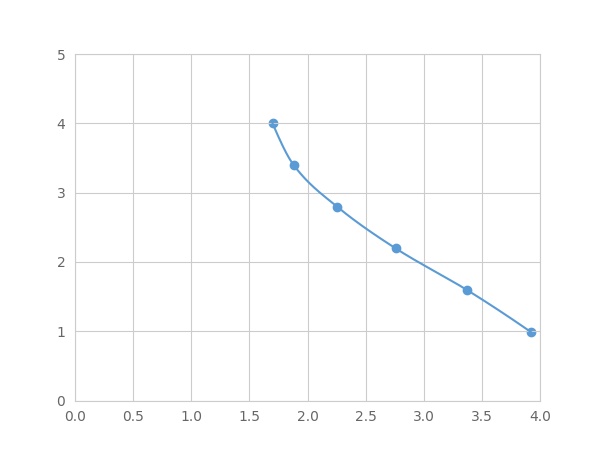Packages (Simulation)

Reagent Preparation

Image (I)
Image (II)
Certificate


Multiplex Assay Kit for Neurogranin (NRGN) ,etc. by FLIA (Flow Luminescence Immunoassay)
Ng; NEUG; Protein Kinase C Substrate RC3
(Note: Up to 8-plex in one testing reaction)
- Product No.LMA404Hu
- Organism SpeciesHomo sapiens (Human) Same name, Different species.
- Sample TypeSerum, plasma, tissue homogenates, cell lysates, cell culture supernates and other biological fluids
- Test MethodCompetitive Inhibition
- Assay Length1.5h
- Detection Range9.77-10000pg/mL
- SensitivityThe minimum detectable dose of this kit is typically less than 3.257 pg/mL.
- DownloadInstruction Manual
- UOM 8Plex 7Plex 6Plex 5Plex 4Plex 3Plex 2Plex1Plex
- FOB
US$ 393
US$ 408
US$ 431
US$ 461
US$ 491
US$ 537
US$ 605
US$ 756
Add to Price Calculator
Result
For more details, please contact local distributors!
Specificity
This assay has high sensitivity and excellent specificity for detection of Neurogranin (NRGN) ,etc. by FLIA (Flow Luminescence Immunoassay).
No significant cross-reactivity or interference between Neurogranin (NRGN) ,etc. by FLIA (Flow Luminescence Immunoassay) and analogues was observed.
Recovery
Matrices listed below were spiked with certain level of recombinant Neurogranin (NRGN) ,etc. by FLIA (Flow Luminescence Immunoassay) and the recovery rates were calculated by comparing the measured value to the expected amount of Neurogranin (NRGN) ,etc. by FLIA (Flow Luminescence Immunoassay) in samples.
| Matrix | Recovery range (%) | Average(%) |
| serum(n=5) | 93-101 | 97 |
| EDTA plasma(n=5) | 90-104 | 97 |
| heparin plasma(n=5) | 78-93 | 83 |
Precision
Intra-assay Precision (Precision within an assay): 3 samples with low, middle and high level Neurogranin (NRGN) ,etc. by FLIA (Flow Luminescence Immunoassay) were tested 20 times on one plate, respectively.
Inter-assay Precision (Precision between assays): 3 samples with low, middle and high level Neurogranin (NRGN) ,etc. by FLIA (Flow Luminescence Immunoassay) were tested on 3 different plates, 8 replicates in each plate.
CV(%) = SD/meanX100
Intra-Assay: CV<10%
Inter-Assay: CV<12%
Linearity
The linearity of the kit was assayed by testing samples spiked with appropriate concentration of Neurogranin (NRGN) ,etc. by FLIA (Flow Luminescence Immunoassay) and their serial dilutions. The results were demonstrated by the percentage of calculated concentration to the expected.
| Sample | 1:2 | 1:4 | 1:8 | 1:16 |
| serum(n=5) | 99-105% | 95-102% | 79-94% | 85-105% |
| EDTA plasma(n=5) | 82-103% | 79-104% | 78-97% | 84-95% |
| heparin plasma(n=5) | 98-105% | 80-103% | 87-94% | 79-95% |
Stability
The stability of kit is determined by the loss rate of activity. The loss rate of this kit is less than 5% within the expiration date under appropriate storage condition.
To minimize extra influence on the performance, operation procedures and lab conditions, especially room temperature, air humidity, incubator temperature should be strictly controlled. It is also strongly suggested that the whole assay is performed by the same operator from the beginning to the end.
Reagents and materials provided
| Reagents | Quantity | Reagents | Quantity |
| 96-well plate | 1 | Plate sealer for 96 wells | 4 |
| Pre-Mixed Standard | 2 | Standard Diluent | 1×20mL |
| Pre-Mixed Magnetic beads (22#:NRGN) | 1 | Analysis buffer | 1×20mL |
| Pre-Mixed Detection Reagent A | 1×120μL | Assay Diluent A | 1×12mL |
| Detection Reagent B (PE-SA) | 1×120μL | Assay Diluent B | 1×12mL |
| Sheath Fluid | 1×10mL | Wash Buffer (30 × concentrate) | 1×20mL |
| Instruction manual | 1 |
Assay procedure summary
1. Preparation of standards, reagents and samples before the experiment;
2. Add 50μL standard or sample to each well,
add 10μL magnetic beads,and 50μL Detection Reagent A,incubate 60min at 37°C on shaker;
3. Wash plate on magnetic frame for three times;
4. Add 100μL prepared Detection Reagent B, and incubate 30 min at 37°C on shaker;
5. Wash plate on magnetic frame for three times;
6. Add 100μL sheath solution, swirl for 2 minutes, read on the machine.
GIVEAWAYS
INCREMENT SERVICES
| Magazine | Citations |
| Alzheimer's & Dementia: Diagnosis, Assessment & Disease Monitoring | Prediction of conversion from mild cognitive impairment to dementia with neuronally derived blood exosome protein profile Pubmed:27408937 |
| Annals of Clinical and Translational Neurology | Plasma neuronal exosomal levels of Alzheimer's disease biomarkers in normal aging Pubmed:27231710 |
| The FASEB Journal | Decreased synaptic proteins in neuronal exosomes of frontotemporal dementia and Alzheimer’s disease pubmed:27601437 |
| Journal of Alzheimer's Disease | Growth Hormone-Releasing Hormone Administration in Mild Cognitive Impairment and Its Impact on Neuronal Exosome Biomarkers of Dementia Doi: 10.3233/JAD-180302 |
| SYNAPTIC PROTEIN BIOMARKERS AND DIFFERENTIAL DIAGNOSIS OF ALZHEIMER'S DISEASE AND OTHER NEURODEGENERATIVE DISORDERS | |
| Am J Emerg Med | The diagnostic value of neurogranin in patients with carbon monoxide poisoning: Can it show early neurological damage? 34388687 |





